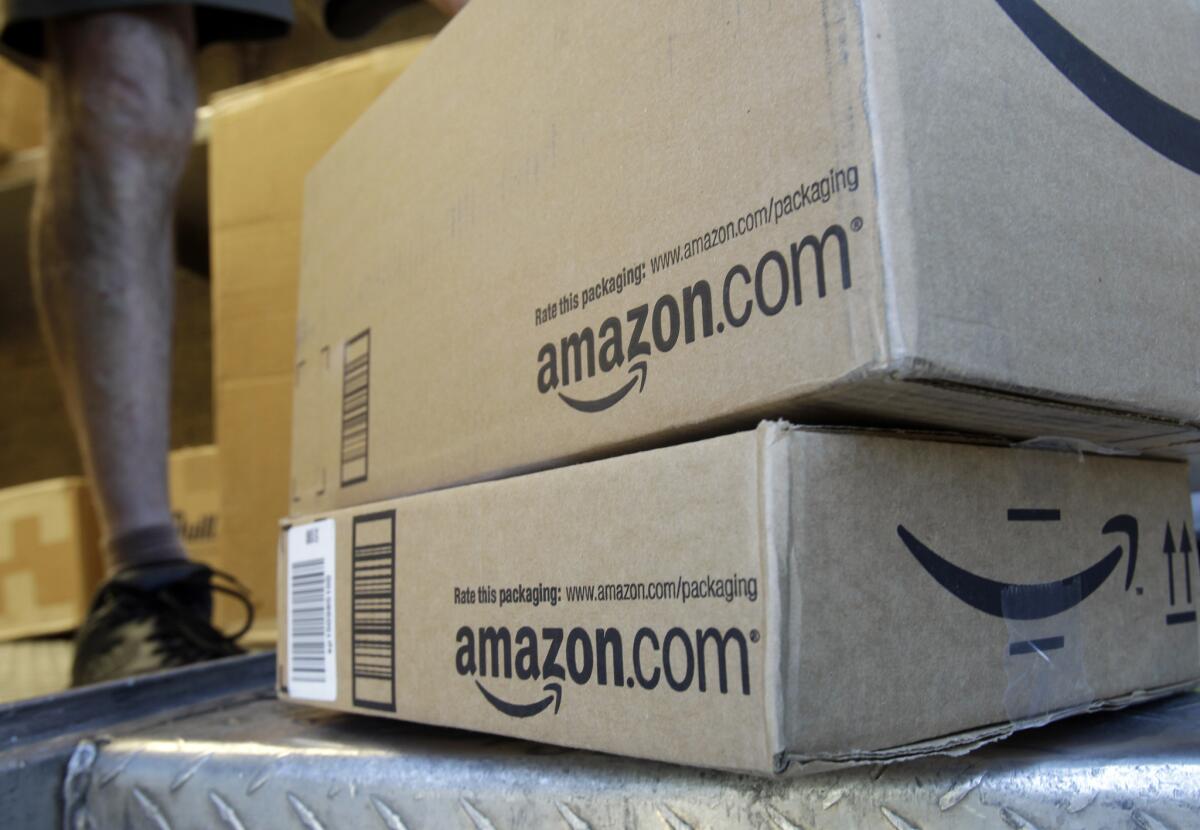Amazon’s Prime Day forces rivals to celebrate ‘Black Friday in July’

- Share via
After its second year hyping Prime Day, Amazon.com has passed an important threshold for invented holidays: It’s not the only one celebrating it.
Using the broader term Black Friday in July, rivals rolled out similar sales in an effort to compete with Amazon, turning the Tuesday sale into a multi-day event.
Macy’s is holding a “Black Friday in July” sale through July 17, while Best Buy is throwing an identically named sale later on July 22 and 23. Through Thursday, both Kohl’s and Toys R Us are also offering extra discounts.
“It’s an arms race,” said Charlie O’Shea, lead retail analyst at Moody’s. “You are either in it or you are losing.”
On Wednesday, Wal-Mart sent what seemed like a pointed jab to its rival after receiving what it said were queries about how its online arm performed the day before. The retailer is offering free shipping this week, and a free 30-day trial of Shipping Pass (its own version of Prime, which normally costs $49 for free two-day shipping).
“We’ve been saying all along that every day is a day for all customers — not just some — to save at Walmart,” the company said in a statement.
See the most-read stories in Business this hour >>
This year, Amazon said it racked up its biggest sales day ever on Prime Day, surpassing even Cyber Monday or Black Friday. Orders were up 60% worldwide compared to last year’s Prime Day, itself a record-breaking day, Amazon said.
But for Amazon, Prime Day likely doesn’t earn the company much, if any, profit, analysts said. Instead, it’s an opportunity for the Seattle-based company to attract new paid members to Prime, its $99 annual subscription service, which promises free two-day shipping and access to streaming entertainment such as TV shows.
Prime customers, the thinking goes, are more likely to shop throughout the year to earn back their sunk cost and take advantage of fast delivery.
Amazon also heavily pushed its own devices on Tuesday, including Fire tablets and Kindle e-readers.
“Prime Day is an investment” on Amazon’s part, O’Shea said. “They sold a bunch of Kindles and Fire sticks and proprietary devices which are an entree into their ecosystem.”
The sales that bombarded shoppers this week are just the latest example of retailers stretching out holidays in an all-out effort to lure customers. Already, Black Friday (the real one that falls after Thanksgiving) has turned into a marathon month of seemingly non-stop discounts.
Many shoppers have been holding back in recent years, prompting month after month of tepid retail sales (although retailers clocked in some gains in April and May).
Now, at the height of summer, is when online and offline retailers hope to score the most money from parents shopping for school-age kids. Amazon happens to have an upper hand over many retailers — as a one-stop portal for bedding, appliances, books and apparel.
O’Shea predicts that Prime Day and Black Friday in July will continue and grow in coming years. This year, retailers were pushing back-to-school sales even before some colleges held their commencement ceremonies.
Back-to-school shopping “happens earlier and earlier,” O’Shea said. “It’s just a question of when people choose to buy, but they are going to buy.”
Twitter: @byshanli
MORE BUSINESS NEWS
Tesla Motors cuts starting price of Model X SUV to $74,000
Stocks edge down; Teva and Juno jump
Fox unpaid intern case is drawing to a close with proposed settlement
More to Read
Inside the business of entertainment
The Wide Shot brings you news, analysis and insights on everything from streaming wars to production — and what it all means for the future.
You may occasionally receive promotional content from the Los Angeles Times.











